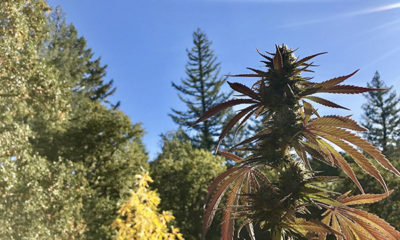
Joint Opinions
Reschedule: Most Likely Scenario for Federal Pot Reform
President Obama recently said in an interview with VICE News that as the trend of marijuana legalization continues to spread across the U.S., Congress will be forced to reconsider its stance on cannabis prohibition.
“At a certain point, if enough states end up decriminalizing, then Congress may then reschedule marijuana,” Obama said.
Coincidentally, Senators Rand Paul of Kentucky, Cory Booker of New Jersey, and Kristen Gillibrand of New York introduced legislation to Congress aimed at downgrading the current Schedule I classification of cannabis to a Schedule II, while amending other aspects of federal law to legalize medical marijuana on a federal level.
Over half the states in the nation have decriminalized the possession of marijuana or legalized it for medical or recreational use, yet the federal government still considers cannabis to be one of the most dangerous substances in the world. And even though the powers that be have been able to get away with spreading pot propaganda for the past several decades to bamboozle the American public into being afraid of the herb, the majority of the population is now convinced of the truth — marijuana is not a dangerous drug and it has a wealth of health benefits.
The Obama Administration announced in 2013 that it was taking a hands off approach to states that legalized marijuana, as long as those markets maintained a strict level of regulation. Yet, some problems have erupted, not because of legal weed, but because of the discrepancies that exist between state and federal law.
For example, some states have passed legislation to legalize CBD oil, the non-intoxicating compound of marijuana used to treat symptoms, but many of these laws don’t come with provisions that allow for cultivation or dispensaries in order for patients to purchase their medicine from home. Anyone in those areas granted permission to possess cannabis oil are forced to obtain it from a “legal state” and essentially smuggle it across state lines — a risky feat that’s highly illegal under federal law and can result in harsh penalties.
As Jeffrey Miron, director of economic studies at the Cato Institute, recently explained in a piece for Newsweek, there are several courses of action the federal government could take immediately in order to eliminate this confusion: 1.) Force the Drug Enforcement Administration to treat prohibition violations with a strict hand, or 2.) Repeal prohibition, altogether, by removing cannabis from the Controlled Substances Act.
As for the first approach, stricter enforcement, Miron writes that this strategy is not likely to prevail because it is too much of a setback.
He said, “Such an approach would require substantial new expenditure and yet have limited impact on marijuana use, based on past experience. Re-escalation would drive the marijuana market back underground, with the attendant violence and corruption of black markets. It would also conflict with growing popular support for marijuana legalization.”
Yet, in the case of the second option, the repeal of prohibition, while it’s the most logical step toward resolving the conflict between state and federal law, Miron explains, “federal legalization may not yet be politically feasible, so intermediate approaches merit consideration.”
Marijuana will most likely be gradually introduced into mainstream society through federal channels with Congress making the Drug Enforcement Administration amend the Controlled Substances Act and downgrade cannabis to a Schedule II — an admission by Uncle Sam that cannabis isn’t a dangerous drug with a high potential for addiction. By reclassifying it Schedule II, cannabis would fall in line with the ranks of prescription painkillers.
Interestingly, the DEA has the authority to reclassify cannabis right now without any guidance from Congress, but this isn’t a measure that anyone anticipates will happen. Nearly 40 years ago, a judge with the DEA delivered a verdict against the Schedule I classification of cannabis.
In his ruling, judge Francis Young said, “Marijuana, in its natural form, is one of the safest therapeutically active substances known to man. By any measure of rational analysis marijuana can be safely used within a supervised routine of medical care.”
Yet, despite this recommendation, the federal government has not forced DEA administrators to give marijuana a second thought.
“Thus congressional action is likely necessary to force the DEA’s hand,” writes Miron.
The natural transition from state-by-state legalization to the total repeal of prohibition is to reschedule marijuana to a Schedule II, which would allow medical marijuana programs to operate without breaking federal law and without violating international drug treaties. However, simply rescheduling cannabis will not solve all of the nation’s problems with respect to the many conundrums surrounding this substance. In fact, it could add unwanted fuel to the fire.
“Federal medicalization is far from a perfect policy,” wrote Miron. “Under medicalization, the federal government might still practice de facto prohibition by interfering with physicians’ ability to prescribe marijuana, as occurs now with other Schedule II drugs. And if federal prescribing restrictions were substantial, the black market for marijuana would re-emerge. Further, treating marijuana as medicine, rather than like other commodities, might impede taxation (this occurs now, partially, in Colorado).”
In addition, rescheduling marijuana would only ease the tyranny imposed on the medical marijuana industry and would have no bearing on the recreational pot markets currently underway in Colorado and Washington state – those scenarios would still be in violation of federal statutes. Yet, it would chip away at a significant portion of the black market, while connecting states in a manner that no longer means federal prison for those who transport the herb across state lines. On the flip side, the concept of rescheduling would open the door to a national market for the pharmaceutical companies, who have the resources to take medical marijuana to whole other level. There is speculation that this is one of the overtones of the recently introduced CARERS Act.
What do you think about the CARERS Act? Share your thoughts in the comments.
























